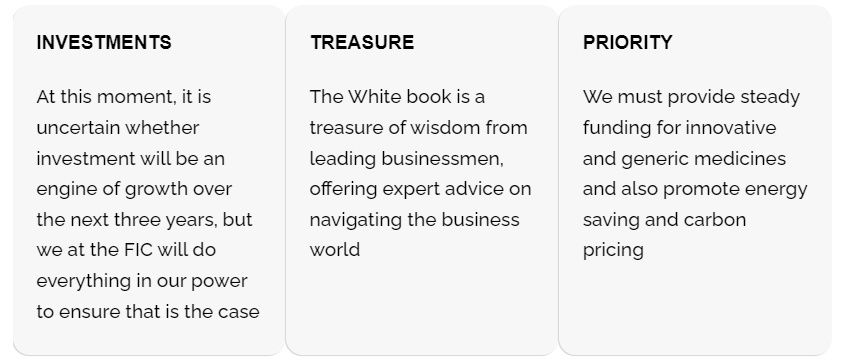Mike Michel, President of the Foreign Investors Council and CEO of Yettel
Serbia Should Return to Investment-led Growth

The FIC advocates for Serbia to pursue investment-led growth, aiming for a 25% share of investments in GDP to achieve a sustainable annual growth rate of 5%. Additionally, the focus should shift towards producing more commodities for export rather than solely providing services for domestic use.
We are in a rocky recovery, with the international order in a turbulent adjustment. There is still time until the end of 2023, so it is not so easy to predict precisely how the year will end, but it seems that both the U.S. and Europe are likely to avoid recession. In general, the slowdown in global growth will probably be less severe than previously expected, while inflation will remain high in many countries. All of this brings great uncertainty for everyone, especially for small economies like Serbia, says Mike Michel, President of the Foreign Investors Council and CEO of Yettel, summarising the year ahead of us.
Consequently, no company was able to remain immune to all the events we have been exposed to.

“That is why I think that the FIC’s job is more important than ever – to represent the unanimous voice of leading investors in the country by addressing a variety of regulatory issues that hinder day-to-day company operations, in very challenging times”, says the FIC President.
Which of the Serbian government’s measures would you rate as having contributed most to strengthening the stability and predictability of the economic environment in the preceding period; where do you see room for further action to be taken?
Without a doubt, these would be e-commerce and digitalisation, especially in electronic communication with public institutions. This was also the main conclusion of the FIC White Book, 2022 edition. We are aware that better outcomes were not achieved because of the challenging economic and geopolitical conditions, but some good things were done. I have to mention that, despite the crisis, the rules in the energy sector improved. As for business groups, real estate performed best. There are several laws that I’d like to highlight: the Law on Electronic Invoicing, which affects the implementation of VAT rules; the amended Law on Planning and Construction and regulation of conversion, adoption of Programme and Action Plan for the Suppression of the Grey Economy for 2023 -2025, Law on Safety and Health at Work , and the new Law on Electronic Communications.

There is still a lot to do. For example, implementation of ESG principles in Serbian regulation and business operations, modernisation and improvement of Labour Law and, also, aligning the Food Safety regulations with EU standards and fully implementing them. There is also the need to amend the Law on Forex Transactions.
An encouraging continuation of foreign investment inflows was recorded during the previous period. What would you recommend that the Government of Serbia do in order to maintain and even improve this tempo?
In 2022, investments did not grow, although foreign direct investments have partially recovered from the negative impact of the Covid-19 crisis. In 2018-19, investments were rooted in construction, but in 2020-22 there was a move to consumption and domestic trade. Industry expanded in 2022, but construction and agriculture contracted.

We at the FIC think that Serbia should return to investment- led growth. Serbia should have a 25% share of investments in GDP to achieve a sustainable GDP growth rate of 5% per year. To reach that goal, private investment should increase by at least 3% to 4%. On the supply side, Serbia should produce more commodities to boost exports, rather than providing services for domestic use.
At this moment, it is uncertain whether investment will be an engine of growth over the next three years, but we at the FIC will do everything in our power to ensure that is the case.
To what extent are key decisions linked to economic development policies and the improvement of the business climate a reflection of consultations carried out with the business sector and what should be improved in this segment in the period ahead?
I’d say to a very great extent. Let me put it this way – our flagship project is our White Book. This is an overview of Serbia’s business climate and a collection of recommendations and proposals to resolve burning issues. Basically, you have 120 foreign companies, from all around the globe, from the EU to the U.S. China, Japan, and Russia, giving concrete, practical and, moreover, feasible recommendations on how to improve the business and investment climate. The 2022 edition consists of 55 articles with 372 recommendations written by 49 authors. For me, this is a pure treasure, having the leading businessmen in the country trying to give their expertise and knowhow on the way to navigate business.

The FIC’s job is to be the keeper and guardian of the pick of the recommendations, making sure that everybody is doing their part of the job. To this end, we implemented a series of activities to keep up the pace. For example, in October 2022, The Implementation of the E-Invoicing Law Conference was held at the Ministry of Finance, where our members had the opportunity to clarify open questions arising from the practical implementation of this law. In April 2023, we organised FIC Insight into the regulation and purposes of hedging as instruments for protection with the NBS Vice Governor as a special guest. In May, we organised FIC Insight on Unlocking ESG. As I have already mentioned, ESG is more important than ever. There are many innovations to do with ESG and Serbian companies should take urgent steps to familiarise themselves with these legislative changes and comply with them, regardless of whether they are related to non-financial reporting, protection of whistleblowers, carbon border adjustment mechanisms, or top-of-the-supply-chain management. In June 2023, we organised the first FIC Financial Services Conference with the participation of the NBS, the Ministry of Finance, Prevention of Money Laundering Administration and all relevant state bodies and business associations.
Considering the acceptance of the White Book recommendations and changes to the general legislative framework, how would you assess Serbia’s progress in terms of complying with the standards of the EU? In what ways does the FIC contribute to that process?
Bringing domestic regulations into line with European standards and expediting work on the White Book recommendations is, by far, our main goal. We always insist on intensifying negotiations with the EU on membership status. At the same time, we are aware that better outcomes were lacking because of the new circumstances. We are also aware that acceptance of the FIC’s recommendations reached a low point in 2022. However, as I said, we are not here just to point to what has not been done, but to propose, motivate, lead, and insist on the changes we want to see. We want to be a part of those changes, not just a silent observer. And, with all the activities I’ve spoken about here, I’m sure we are doing just that.


